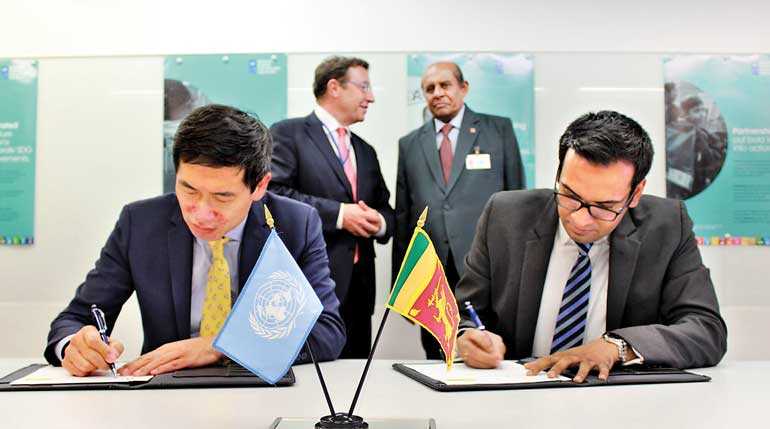Thursday Feb 19, 2026
Thursday Feb 19, 2026
Tuesday, 9 October 2018 00:00 - - {{hitsCtrl.values.hits}}

Two Memoranda of Understanding were signed recently in New York, launching Sri Lanka’s first social impact funds aimed at supporting social entrepreneurs access innovative financing, to help achieve the 2030 Agenda for Sustainable Development.
The signings were witnessed Tilak Marapana, Minister of Foreign Affairs, Government of Sri Lanka, and Achim Steiner, UNDP Administrator, at a special side event, at the 73rd session of the United Nations General Assembly.
The two MoU’s – one for a $ 5 million Social Enterprise Fund (SEF) and one for a $ 20 million Social Impact Capital Fund (SICF) – were signed by Chandula Abeywickrema and Deshan Pushparajah respectively, and by Haoliang Xu, Assistant Administrator and Director of UNDP’s Regional Bureau for Asia and Pacific.
The Sustainable Development Goals are aimed at ending poverty, protecting the planet and ensuring peace and prosperity for all, by 2030. Achieving the goals however, will require a massive amount of resources. The United Nations Conference on Trade and Development (UNCTAD) estimates the sustainable development goals will cost between $5 and $7 trillion, with a funding gap of about $2.5 trillion in developing countries.
Given these global and national pressures on funding, Sri Lanka is keen to explore alternative and innovative means of financing, particularly by leveraging the private sector, to help meet the SDGs. Given that micro, small and medium enterprises (MSMEs) form the backbone of the Sri Lankan economy, and the country’s growing awareness and interest in impact investing and social entrepreneurship, impact funds were identified as a means of mobilising funding for the SDGs in Sri Lanka.
In order to address this, the Lanka Impact Investing Network and Tempest PE Partners (a member of the Capital Alliance Group), in collaboration with UNDP, pioneered Sri Lanka’s first social impact funds.
“UNDP is committed to helping countries to achieve the SDGS. These social impact funds will play a key role in that mission, by supporting social entrepreneurship in Sri Lanka,” said Haoliang Xu, UN Assistant Secretary-General, and Director of UNDP’s Regional Bureau for Asia and the Pacific. “Together with the establishment of the funds, UNDP is committed to supporting Sri Lanka further leverage innovating financing models to realise the vision of a sustainable future by 2030.”
The Social Enterprise Fund (SEF) will cater mostly to successfully incubated, commercially viable, micro and small social enterprises with capital requirements of less than $ 100,000. In addition to capital, the fund will also provide targeted technical and capacity development support through mentorship, business support and training. The Social Impact Capital Fund (SICF) will support inclusive and responsible businesses that integrate and promote social impact, as a part of their business models. The SICF’s investments will be larger, in excess of $ 100,000. UNDP will be responsible for impact measurement and management of the projects for both funds, to ensure they are well aligned with the SDGs and achieve significant social impact.
Speaking about the initiative, Lanka Impact Investing Network the Founder and Chairman Chandula Abeywickrema said, “Lanka Impact Investing Network (LIIN) has taken a number of pioneering initiatives to create a social entrepreneurship ecosystem and to build the impact investing landscape in Sri Lanka to drive the culture of entrepreneurship.”
Capital Alliance Group Chief Executive Officer Ajith Fernando added, “We are pleased to be partnering with Lanka Impact Investing Network and UNDP in this timely push to develop an impact investment franchise. We are strong believers that given an enabling environment, sustainable and profitable solutions for the social problems of our day can and will come from the private sector.”